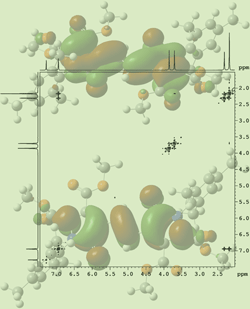issue contents
September 1999 issue

Cover illustration: Aqua(benzo-15-crown-5)lithium--hexa-mu-iodotetracopper--benzo-15-crown-5 (2/1/2), bis[bis(benzo-15-crown-5)caesium] hexa-mu-iodotetracopper and mu-aqua-bis[aqua(18-crown-6)sodium] hexa-mu-iodotetracopper, see Nurtaeva & Holt, pages 1453-1457. Displacement ellipsoids are shown at the 50% probability level.
cif-access (inorganic compounds)
Download citation


Download citation


Hydrothermally grown single crystals of the title compound, Na2ZnGeO4, are monoclinic [space group Pn (No.7)]. The structure is confirmed; recognition of the true monoclinic symmetry with pseudo-orthorhombic twinning enabled refinement to R = 0.022 from data measured at 150K.
cif-access (metal-organic compounds)
Download citation


Download citation


The Sn atom in 2,2'-iminodipyridinium(1+) dichlorotriphenylstannate, (C10H10N3)[SnCl2(C6H5)3], shows trans-C3SnCl2 trigonal-bipyramidal coordination. The stannate anion is linked by hydrogen bonds to adjacent counter-ions to form a chain. 2,2'-Iminodipyridinium(1+) bis(trifluoroacetato)tricyclohexylstannate, (C10H10N3)[Sn(C2F3O2)(C6H11)3], adopts a similar hydrogen-bonded chain structure.
Download citation


Download citation


In the crystal structure of the title compound, the Rh atom lies on an inversion centre and has a square-planar geometry with Rh—P = 2.3217(6), Rh—C = 1.954(2)Å and P—Rh—C = 86.74(7)°. The carborane anion lies about a twofold axis and is disordered.
Download citation


Download citation


The title compound shows a nearly planar PRe2Ag ring with significantly different Re—Ag single-bond lengths of 2.7957(7) and 2.8235(7)Å.
Download citation


Download citation


In the structure of the title complex, [CuBr(phen)(PPh3)], the coordination polyhedron with copper as the central atom is a distorted tetrahedron, with two N atoms of phenathroline, one Br atom and one P atom of PPh3 occupying the four corners.
Download citation


Download citation


The structure of the title compound, bis(2,2'-bipyridine-N,N')(pyridine-2-carboxylate-N,O)ruthenium( II) hexafluorophosphate, determined at 173K, is in good agreement with the structure determined at 295K [Canty et al. (1997). Inorg. Chim. Acta, 255, 117–123]. The coordination formed by five N atoms and one O atom around the RuII ion deviates substantially from octahedral symmetry. The relatively large thermal parameters of the F atoms in the PF6 anion can be assumed as being due to substantial rigid group vibrations.
cif-access (organic compounds)
Download citation


Download citation


Domperidone maleate or 4-[5-chloro-2,3-dihydro-2-oxo-1H-benzimidazol-1-yl]-1-[(2,3-dihydro-2-oxo-1H-benzimidazol-1-yl)propyl]piperidinium maleate, an antiemetic drug, crystallizes as a 2.5-hydrate. The hydrogen-bonding interactions between the drug molecule, the maleate group and the water molecules stabilize the molecules in the lattice. Further stability comes from stacking interactions among the benzimidazole rings.
Download citation


Download citation


The title compound was isolated during impurity profiling of the drug finasteride. This molecule is a saturated form of finasteride where the A/B ring junction is cis. The compound is a methanol solvate and there are hydrogen-bonding interactions between the androstane and methanol solvate molecules.
Download citation


Download citation


Initiation and progress of the majority of breast cancer cases are influenced by a family of hormones called estrogens. Estradiol is one of the three naturally occurring estrogens. This submission reports estradiol in a previously unknown crystal modification as the methanol hemisolvate.
Download citation


Download citation


In the title compound, each I atom is situated 3.80Å from the ring centroid of a nearby pyridium ring, with shortest iodide contacts to that ring in the range 4.02–4.05Å. The closest contacts from iodide to the dication are in the range 3.77–4.05Å, with shortest distances to the N and ortho-C atoms of 3.843(3) and 3.770(4)Å, respectively.
Download citation


Download citation


The title compound is a stable radical with the piperidine ring adopting a chair conformation. The nitroxyl bond length is 1.283(2)Å and the N—O. bond forms an angle of 19.9 (2)° with the CNC plane; the C—N—C angle is 124.5 (2)°.
Download citation


Download citation


The title compound is a tricyclic polyfunctional system bearing an aromatic ring with a chlorine and a methylmalonate substituent, and a bicyclo[3.3.2]decane subunit with another chlorine and an enone functionality.
Download citation


Download citation


The structure of the title compound, [(CH3)3CNH2NH2]Cl, first determined by Hökelek & Yag~basen [Acta Cryst. (1988), C44, 723–725], has been redetermined. In contrast to the previous investigation, no hydrochloride moiety was found. The present structure consists of [(CH3)3C(NH2)(NH2)]+ cations and Cl− anions connected by hydrogen bonds.
Download citation


Download citation


The crystal structures of the title compounds, (±)-(3'aα,3'bα,-6'aα,7'aα)-, (I), and (±)-(3'aα,3'bβ,6'aβ,7'aα)-, (II), have been determined at 134 and 135 K, respectively. The pentaleno[2,1-b]furan group has an endo conformation in (I) and an exo conformation in (II). The axial C—C bond attached to the spiro center is about 0.02Å longer than the equatorial C—C bond.
inorganic compounds
Download citation


Download citation


The crystal structure of the title mixed-valence copper–cyanide complex comprises infinite polymeric double chains. The geometry about the CuI centres is approximately trigonal pyramidal, and each CuII centre adopts a slightly distorted square-pyramidal coordination, with one NH3 ligand being disordered equally over two alternative sites.
Download citation


Download citation


The crystal structure of the mixed transition-metal molybdate β-AMoO4, with A = 30% Fe and 70% Co, is built up from AO6 octahedra and MoO4 tetrahedra. The Fe and Co distribution is different for the two A sites.
Download citation


Download citation


The title compound is a non-stoichiometric ionic conductor with the chemical formula K1.67Mg0.67(Al10.33-xGax)O17, where x = 1.75. This corresponds to a 17% gallium substitution of the aluminium spinel block framework. The gallium substitution influences the mobile K+ ion distribution and hence the ion conductivity.
Download citation


Download citation


The polyanion chain, extending along the b direction, is formed by MgO6 octahedra sharing O atoms from different paradodecatungstate groups.
Download citation


Download citation


The title compound, potassium niobium aluminium arsenate (KNAA), is isostructural with KTiOPO4 (KTP). In KNAA, the site corresponding to the Ti1 sites of KTP is occupied mostly by Nb atoms, the Ti2 site is occupied predominantly by Al atoms, and the As1 and As2 tetrahedral sites are occupied mostly by As atoms.
Download citation


Download citation


The title non-linear optical material has tetrahedral Zn and Cd atoms connected in a three-dimensional network by Cd—S=C=N—Zn bridges which are linear at C and N, but bent at S.
Download citation


Download citation


The structure of γ-Sr(PO3)2 consists of (Sr4O22)n double chains and infinite (PO3)n polyphosphate chains linked together by sharing edges and corners. The structure of β-Sr(PO3)2 has been redetermined.
Download citation


Download citation


The title compound is built up from ZnO6 octahedra, SeO3 pyramids and NaO4 tetrahedra, sharing vertices and edges. It is iso- structural with NaCo2(OH)(SeO3)2.
Download citation


Download citation


Dibarium gallium hydrogen bis(diphosphate) was synthesized by high temperature–pressure hydrothermal reaction. The structure consists of infinite chains of corner-sharing GaO6 octahedra and H0.5P2O7 groups, which are topologically similar to that found in Cs2GaH3(P2O7)2.
metal-organic compounds
Download citation


Download citation


Download citation


Download citation


Download citation


Download citation


Download citation


Download citation


Download citation


Download citation


Download citation


Download citation


Download citation


Download citation


Download citation


Download citation


Download citation


Download citation


Download citation


Download citation


Download citation


Download citation


Download citation


Download citation


Download citation


Download citation


Download citation


Download citation


Download citation


Download citation


Download citation


Download citation


Download citation


Download citation


Download citation


Download citation


Download citation


Download citation


Download citation


Download citation


Download citation


Download citation


Download citation


Download citation


Download citation


Download citation


Download citation


Download citation


Download citation


Download citation


Download citation


Download citation


Download citation


Download citation


The structures of the commensurate 1/4 and 1/5 phases of the displacively modulated compound D-BCCD [deuterated betaine (trimethylammonioacetate) calcium chloride dihydrate, i.e. (CD3)3NCD2COOCaCl2(D2O)2 or CaCl2.C5D11NO2.2D2O] have been determined by single-crystal neutron diffraction at 100 and 68 K, respectively. The structural model of the 1/4 phase is found to be quite different from that obtained previously from X-ray diffraction data of the hydrogenated compound.
Download citation


Download citation


Download citation


Download citation


Download citation


Download citation


Download citation


Download citation


Download citation


Download citation


Download citation


Download citation


Download citation


Download citation


organic compounds
Download citation


Download citation


Download citation


Download citation


Download citation


Download citation


Download citation


Download citation


Download citation


Download citation


Download citation


Download citation


Download citation


Download citation


Download citation


Download citation


Download citation


Download citation


Download citation


Download citation


Download citation


Download citation


Download citation


Download citation


Download citation


Download citation


Download citation


Download citation


Download citation


Download citation


Download citation


Download citation


Download citation


Download citation


Download citation


Download citation


Download citation


Download citation


Download citation


Download citation


Download citation


Download citation


Download citation


Download citation


Download citation


Download citation


Download citation


Download citation


Download citation


Download citation


Download citation


Download citation


Download citation


Download citation


Download citation


Download citation


Download citation


Download citation


Download citation


Download citation


Download citation


Download citation


Download citation


Download citation


Download citation


Download citation


Download citation


Download citation


Download citation


Download citation


Download citation


Download citation


Download citation


Download citation


Download citation


Download citation


Download citation


Download citation


Download citation


Download citation


Download citation


Download citation


Download citation


Download citation


Download citation


Download citation


Download citation


Download citation


Download citation


Download citation


Download citation


Download citation


Download citation


Download citation


Download citation


Download citation


Download citation


Download citation


Download citation


Download citation




 journal menu
journal menu




























































































































